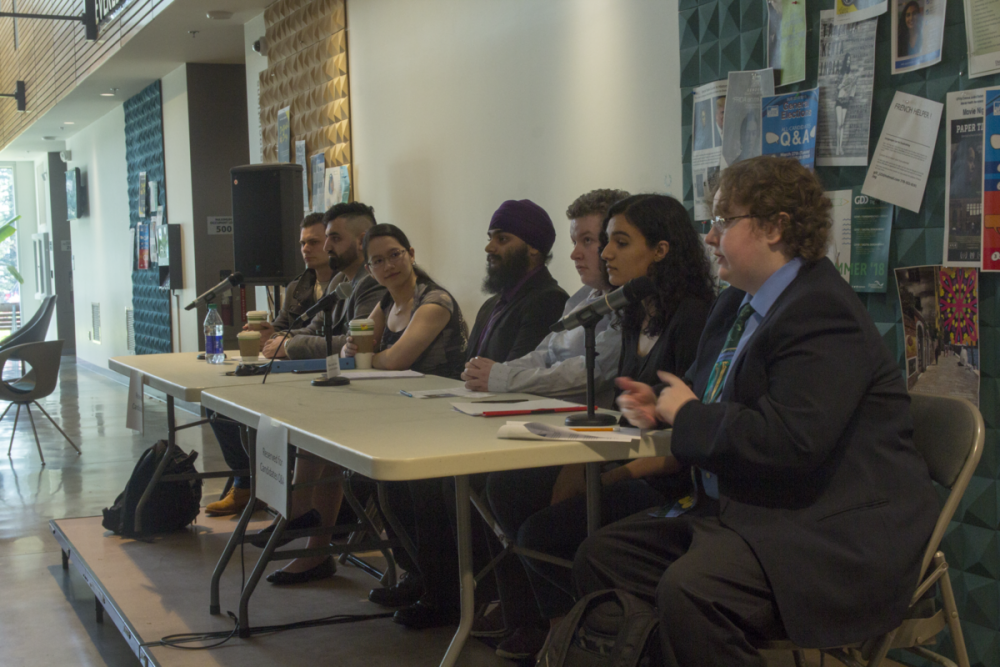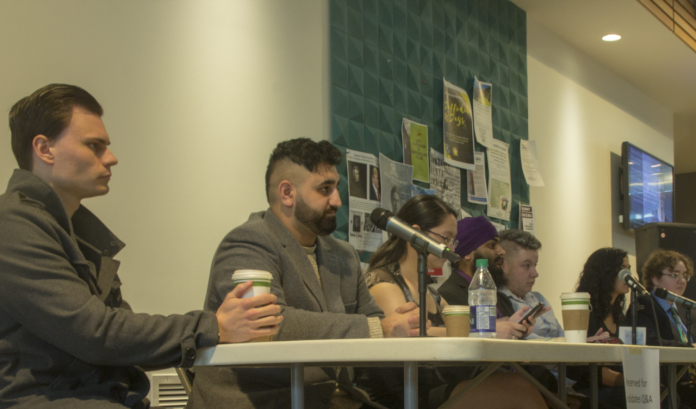By Jessica Barclay and Jen Klassen
The Student Union Society’s six election candidates participated in a series of three question and answer periods on their platforms last week. The first two periods, one in Abbotsford on March 27, and one in Chilliwack on March 29, involved asking every candidate three questions each. The final “Reality Check” Q&A, hosted in Abbotsford on April 3, allowed follow-up questions for candidates.
Three of the candidates, Jaleen MacKay, Gurvir Gill, and Andrew Stahl are re-running uncontested for their respective positions. Rajdeep Daliwahl and Logan Clelland are both contending for the position of vice president external, and Sharnpreet (Sunny) Singh and Alec Zinman for the newly created position of vice president students.
The most heated exchange was between Clelland and Daliwahl, the two contending candidates for the vice president external position. Both were asked about their knowledge of any campaigns undertaken by the Canadian Alliance of Student Associations (CASA) over the last 12 months.
Clelland responded with a list of CASA’s recent achievements, to which Daliwahl countered she was unable to emulate, due to not having a laptop in front of her. Clelland was the only candidate who had a computer, though commented outside of the Q&A session that nothing had been said indicating laptops were not allowed at the debate.
Daliwahl later said she regretted her comment, but stated that the laptop’s presence in the debate was “not appropriate.”
Daliwahl did not comment further on CASA, instead directing her response to the benefits of the Alliance of B.C. Students (ABCS), believing they could provide a voice when it came to making protective policies for students. In a follow-up question regarding ABCS’ bankruptcy, and the money they still owe to SUS, Daliwahl acknowledged her concern, but was unable to elaborate due to “not knowing too much about ABCS.”
Clelland elaborated on CASA, saying he did not think CASA would advocate for SUS unless asked.
“I really think it’s the job of the vice president external to talk to CASA about things that we think should be advocated for,” Clelland said.

Singh and Zinman are both running for vice president students, a new position created from the division of the vice president internal portfolio.
The question of international students and their transition to UFV via the new student orientation was posed to both candidates for the vice president students role. Singh declared he desires to see each student leaving with a clear idea of what UFV is, and what services are offered. He said he would work with Student Life to determine the best way to reach this goal. Zinman responded by affirming what Singh said, and adding that he would like to showcase certain services that may be more important to international students, as well as working with students to determine their needs.
In terms of running events with SUS’s budget running in a deficit, Singh said he wished to focus on improving the turnout to current events until he can look further into the SUS budget. Zinman said he would look to run smaller events that would be more budget friendly.
When posed the question of how they would address sexual violence on campus, Zinman said he would defer to those with more experience in the matter, such as Student Life. He also said he would look into introducing a Student Rights Association, an association he said helps students get to know their rights. At a previous Q&A session, Singh suggested having security patrol more frequently, and keeping someone in the office at all times. He further discussed the benefit of running events that give students an opportunity to make friends, which can help in the prevention of sexual violence.
“A lot of sexual violence happens when an individual is alone and vulnerable,” Singh said.
MacKay is the current vice president internal, and running again without contest. When asked about balancing the budget while still consulting students, MacKay said it can be a “delicate dance” between the needs of SUS, and the wants of students. In terms of the Canoe’s deficit, MacKay said that it was fiscally irresponsible to be paying into a deficit, and that it was not something she believed students wanted to contribute to.
“I don’t think it can continue the way it has been, so one way or another it is going to require revision,” said MacKay.
Stahl is running uncontested as the college of arts representative, a position he held the previous year as well. He said his plan will be continuing his current engagement model into this year by contacting leadership in the college of arts in “off the book” conversations, with a few changes he did not divulge. He said that the “other end of the stick” is leadership choosing to engage with him in turn. When asked about his work advocating for CASA for student-friendly policies, Stahl responded that it was difficult to gauge what CASA’s contribution had been, and what was done by the new NDP government.
When Gill, who is running uncontested for the role of president, was questioned about ensuring the success of the new executives, he stated the importance of “making sure everyone is on par with the organization.” Gill had commented in a previous Q&A that his relationships within the university made him a good candidate for refilling the position as president. When asked about advocating for students at the risk of jeopardizing his relationship with the university, he said he would be willing to have those conversations. When further probed about issues he’s brought up to the university, he summarized issues SUS had, but was unable to comment on exclusive student concerns raised.


